Business Ethics: Evaluating the Business Models of Uber and Deliveroo
VerifiedAdded on 2021/04/21
|10
|2844
|100
Essay
AI Summary
This essay provides a critical analysis of the business ethics of Uber and Deliveroo, two prominent companies with innovative but controversial business models. It delves into the ethical considerations surrounding employee management, highlighting the classification of drivers and delivery partners as freelancers rather than full-time employees, leading to concerns about minimum wage, benefits, and organizational control. The essay also examines customer service issues, particularly regarding safety and security, and the impact of surge pricing on customer satisfaction. Furthermore, it explores the financial performance of Uber, including its history of losses and the potential for unethical practices related to driver compensation. The analysis concludes that both companies exhibit unethical business practices, impacting both employees and customers.

Running head: BUSINESS ETHICS
Business ethics
Name of the student
Name of the university
Author note
Business ethics
Name of the student
Name of the university
Author note
Paraphrase This Document
Need a fresh take? Get an instant paraphrase of this document with our AI Paraphraser
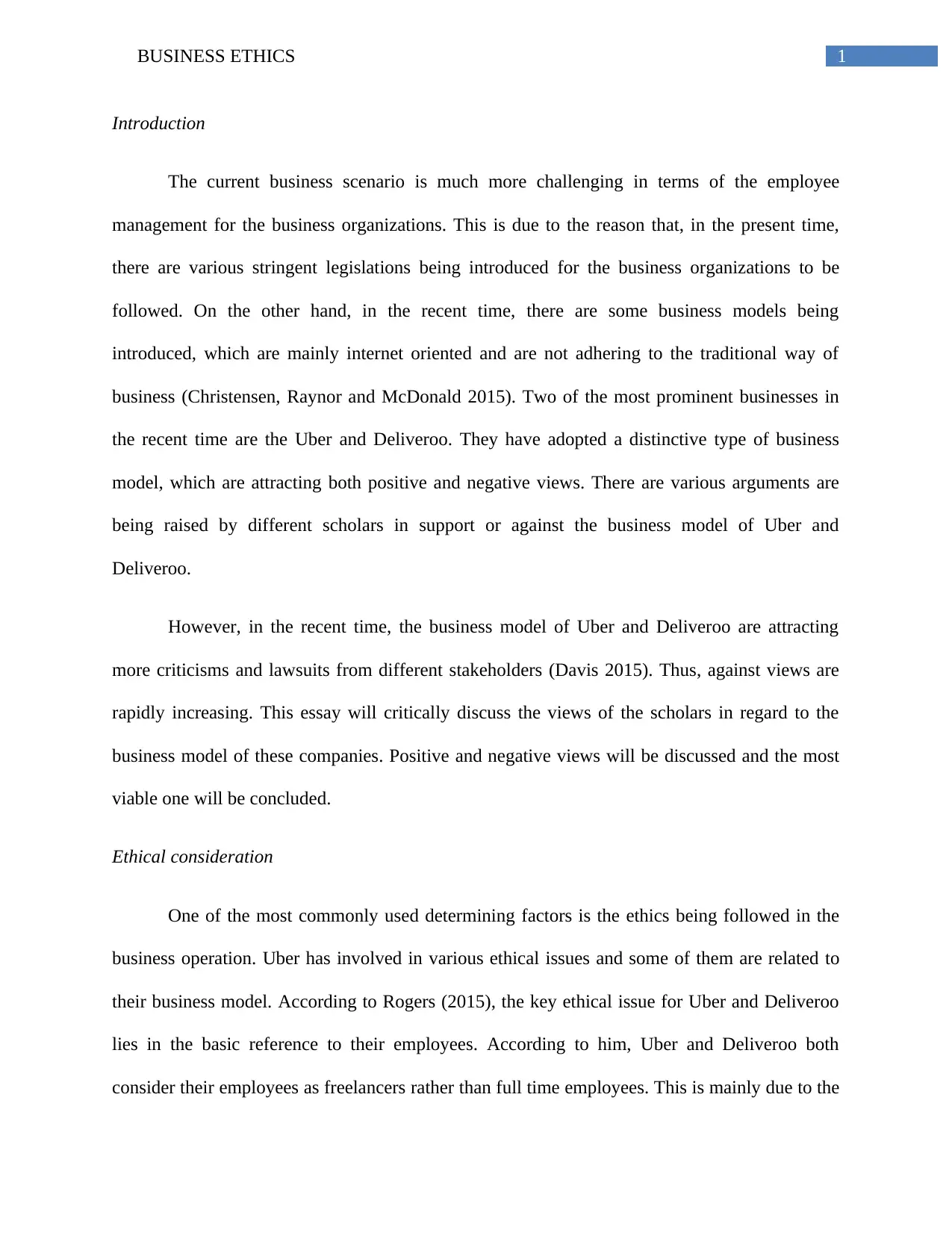
1BUSINESS ETHICS
Introduction
The current business scenario is much more challenging in terms of the employee
management for the business organizations. This is due to the reason that, in the present time,
there are various stringent legislations being introduced for the business organizations to be
followed. On the other hand, in the recent time, there are some business models being
introduced, which are mainly internet oriented and are not adhering to the traditional way of
business (Christensen, Raynor and McDonald 2015). Two of the most prominent businesses in
the recent time are the Uber and Deliveroo. They have adopted a distinctive type of business
model, which are attracting both positive and negative views. There are various arguments are
being raised by different scholars in support or against the business model of Uber and
Deliveroo.
However, in the recent time, the business model of Uber and Deliveroo are attracting
more criticisms and lawsuits from different stakeholders (Davis 2015). Thus, against views are
rapidly increasing. This essay will critically discuss the views of the scholars in regard to the
business model of these companies. Positive and negative views will be discussed and the most
viable one will be concluded.
Ethical consideration
One of the most commonly used determining factors is the ethics being followed in the
business operation. Uber has involved in various ethical issues and some of them are related to
their business model. According to Rogers (2015), the key ethical issue for Uber and Deliveroo
lies in the basic reference to their employees. According to him, Uber and Deliveroo both
consider their employees as freelancers rather than full time employees. This is mainly due to the
Introduction
The current business scenario is much more challenging in terms of the employee
management for the business organizations. This is due to the reason that, in the present time,
there are various stringent legislations being introduced for the business organizations to be
followed. On the other hand, in the recent time, there are some business models being
introduced, which are mainly internet oriented and are not adhering to the traditional way of
business (Christensen, Raynor and McDonald 2015). Two of the most prominent businesses in
the recent time are the Uber and Deliveroo. They have adopted a distinctive type of business
model, which are attracting both positive and negative views. There are various arguments are
being raised by different scholars in support or against the business model of Uber and
Deliveroo.
However, in the recent time, the business model of Uber and Deliveroo are attracting
more criticisms and lawsuits from different stakeholders (Davis 2015). Thus, against views are
rapidly increasing. This essay will critically discuss the views of the scholars in regard to the
business model of these companies. Positive and negative views will be discussed and the most
viable one will be concluded.
Ethical consideration
One of the most commonly used determining factors is the ethics being followed in the
business operation. Uber has involved in various ethical issues and some of them are related to
their business model. According to Rogers (2015), the key ethical issue for Uber and Deliveroo
lies in the basic reference to their employees. According to him, Uber and Deliveroo both
consider their employees as freelancers rather than full time employees. This is mainly due to the
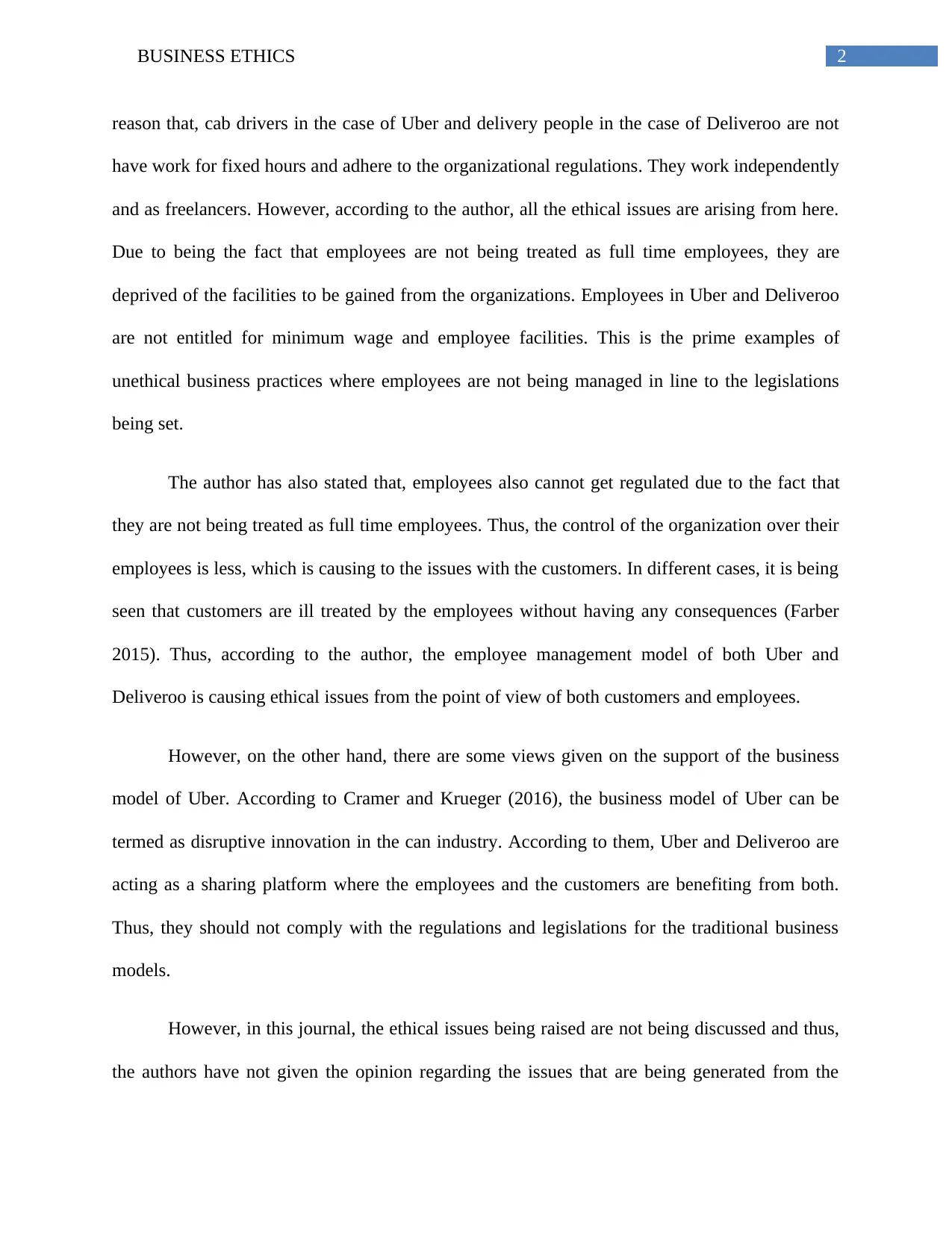
2BUSINESS ETHICS
reason that, cab drivers in the case of Uber and delivery people in the case of Deliveroo are not
have work for fixed hours and adhere to the organizational regulations. They work independently
and as freelancers. However, according to the author, all the ethical issues are arising from here.
Due to being the fact that employees are not being treated as full time employees, they are
deprived of the facilities to be gained from the organizations. Employees in Uber and Deliveroo
are not entitled for minimum wage and employee facilities. This is the prime examples of
unethical business practices where employees are not being managed in line to the legislations
being set.
The author has also stated that, employees also cannot get regulated due to the fact that
they are not being treated as full time employees. Thus, the control of the organization over their
employees is less, which is causing to the issues with the customers. In different cases, it is being
seen that customers are ill treated by the employees without having any consequences (Farber
2015). Thus, according to the author, the employee management model of both Uber and
Deliveroo is causing ethical issues from the point of view of both customers and employees.
However, on the other hand, there are some views given on the support of the business
model of Uber. According to Cramer and Krueger (2016), the business model of Uber can be
termed as disruptive innovation in the can industry. According to them, Uber and Deliveroo are
acting as a sharing platform where the employees and the customers are benefiting from both.
Thus, they should not comply with the regulations and legislations for the traditional business
models.
However, in this journal, the ethical issues being raised are not being discussed and thus,
the authors have not given the opinion regarding the issues that are being generated from the
reason that, cab drivers in the case of Uber and delivery people in the case of Deliveroo are not
have work for fixed hours and adhere to the organizational regulations. They work independently
and as freelancers. However, according to the author, all the ethical issues are arising from here.
Due to being the fact that employees are not being treated as full time employees, they are
deprived of the facilities to be gained from the organizations. Employees in Uber and Deliveroo
are not entitled for minimum wage and employee facilities. This is the prime examples of
unethical business practices where employees are not being managed in line to the legislations
being set.
The author has also stated that, employees also cannot get regulated due to the fact that
they are not being treated as full time employees. Thus, the control of the organization over their
employees is less, which is causing to the issues with the customers. In different cases, it is being
seen that customers are ill treated by the employees without having any consequences (Farber
2015). Thus, according to the author, the employee management model of both Uber and
Deliveroo is causing ethical issues from the point of view of both customers and employees.
However, on the other hand, there are some views given on the support of the business
model of Uber. According to Cramer and Krueger (2016), the business model of Uber can be
termed as disruptive innovation in the can industry. According to them, Uber and Deliveroo are
acting as a sharing platform where the employees and the customers are benefiting from both.
Thus, they should not comply with the regulations and legislations for the traditional business
models.
However, in this journal, the ethical issues being raised are not being discussed and thus,
the authors have not given the opinion regarding the issues that are being generated from the
⊘ This is a preview!⊘
Do you want full access?
Subscribe today to unlock all pages.

Trusted by 1+ million students worldwide
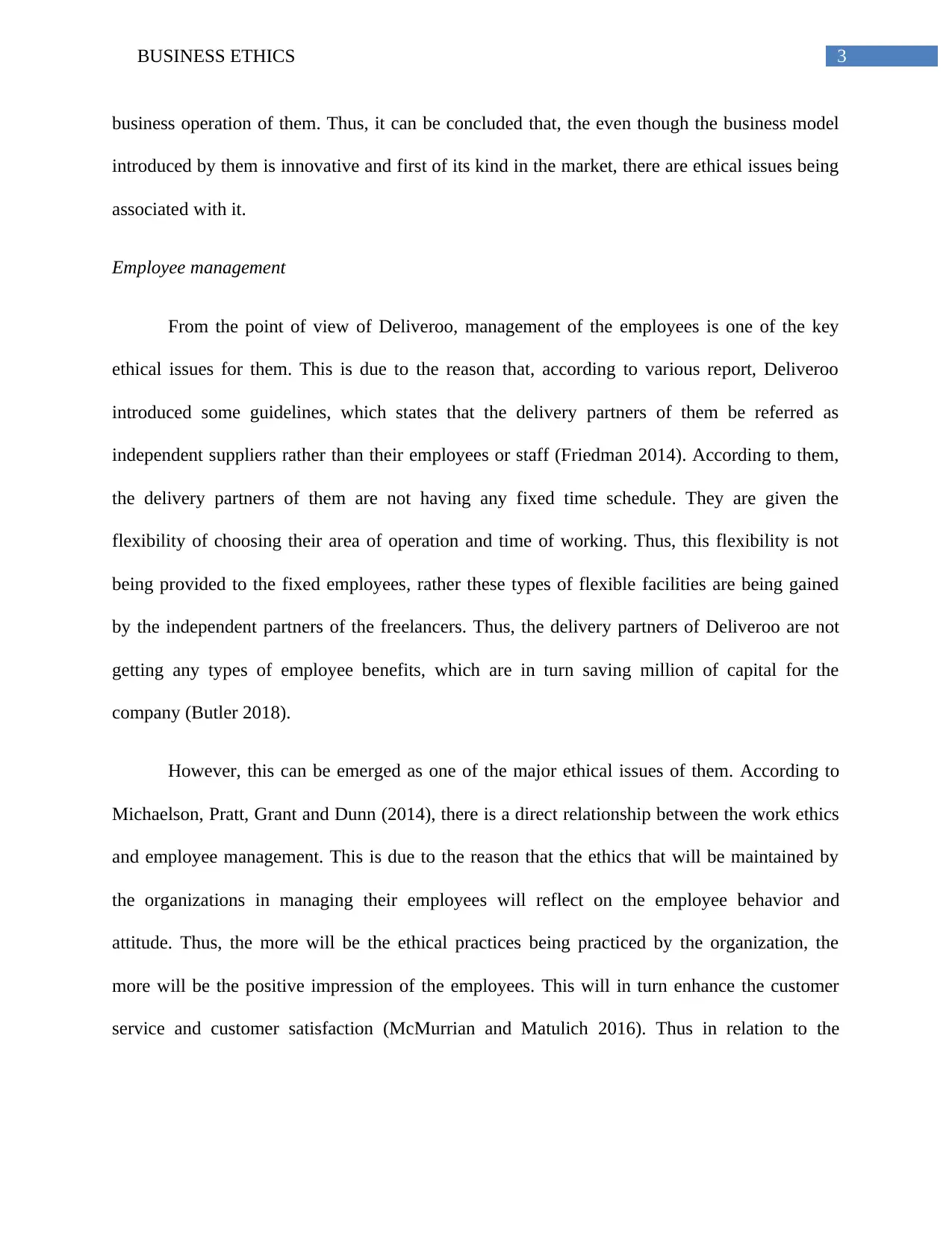
3BUSINESS ETHICS
business operation of them. Thus, it can be concluded that, the even though the business model
introduced by them is innovative and first of its kind in the market, there are ethical issues being
associated with it.
Employee management
From the point of view of Deliveroo, management of the employees is one of the key
ethical issues for them. This is due to the reason that, according to various report, Deliveroo
introduced some guidelines, which states that the delivery partners of them be referred as
independent suppliers rather than their employees or staff (Friedman 2014). According to them,
the delivery partners of them are not having any fixed time schedule. They are given the
flexibility of choosing their area of operation and time of working. Thus, this flexibility is not
being provided to the fixed employees, rather these types of flexible facilities are being gained
by the independent partners of the freelancers. Thus, the delivery partners of Deliveroo are not
getting any types of employee benefits, which are in turn saving million of capital for the
company (Butler 2018).
However, this can be emerged as one of the major ethical issues of them. According to
Michaelson, Pratt, Grant and Dunn (2014), there is a direct relationship between the work ethics
and employee management. This is due to the reason that the ethics that will be maintained by
the organizations in managing their employees will reflect on the employee behavior and
attitude. Thus, the more will be the ethical practices being practiced by the organization, the
more will be the positive impression of the employees. This will in turn enhance the customer
service and customer satisfaction (McMurrian and Matulich 2016). Thus in relation to the
business operation of them. Thus, it can be concluded that, the even though the business model
introduced by them is innovative and first of its kind in the market, there are ethical issues being
associated with it.
Employee management
From the point of view of Deliveroo, management of the employees is one of the key
ethical issues for them. This is due to the reason that, according to various report, Deliveroo
introduced some guidelines, which states that the delivery partners of them be referred as
independent suppliers rather than their employees or staff (Friedman 2014). According to them,
the delivery partners of them are not having any fixed time schedule. They are given the
flexibility of choosing their area of operation and time of working. Thus, this flexibility is not
being provided to the fixed employees, rather these types of flexible facilities are being gained
by the independent partners of the freelancers. Thus, the delivery partners of Deliveroo are not
getting any types of employee benefits, which are in turn saving million of capital for the
company (Butler 2018).
However, this can be emerged as one of the major ethical issues of them. According to
Michaelson, Pratt, Grant and Dunn (2014), there is a direct relationship between the work ethics
and employee management. This is due to the reason that the ethics that will be maintained by
the organizations in managing their employees will reflect on the employee behavior and
attitude. Thus, the more will be the ethical practices being practiced by the organization, the
more will be the positive impression of the employees. This will in turn enhance the customer
service and customer satisfaction (McMurrian and Matulich 2016). Thus in relation to the
Paraphrase This Document
Need a fresh take? Get an instant paraphrase of this document with our AI Paraphraser
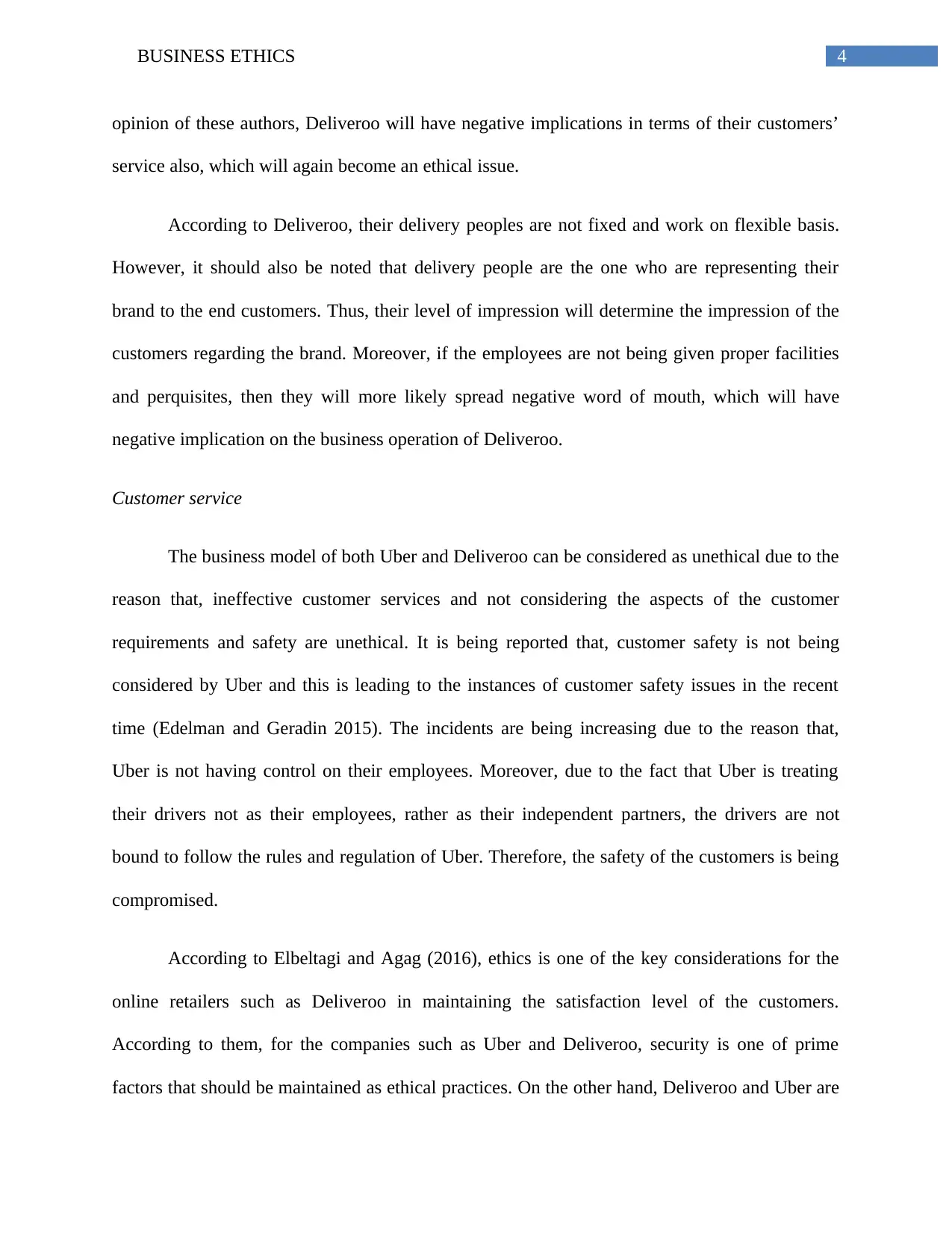
4BUSINESS ETHICS
opinion of these authors, Deliveroo will have negative implications in terms of their customers’
service also, which will again become an ethical issue.
According to Deliveroo, their delivery peoples are not fixed and work on flexible basis.
However, it should also be noted that delivery people are the one who are representing their
brand to the end customers. Thus, their level of impression will determine the impression of the
customers regarding the brand. Moreover, if the employees are not being given proper facilities
and perquisites, then they will more likely spread negative word of mouth, which will have
negative implication on the business operation of Deliveroo.
Customer service
The business model of both Uber and Deliveroo can be considered as unethical due to the
reason that, ineffective customer services and not considering the aspects of the customer
requirements and safety are unethical. It is being reported that, customer safety is not being
considered by Uber and this is leading to the instances of customer safety issues in the recent
time (Edelman and Geradin 2015). The incidents are being increasing due to the reason that,
Uber is not having control on their employees. Moreover, due to the fact that Uber is treating
their drivers not as their employees, rather as their independent partners, the drivers are not
bound to follow the rules and regulation of Uber. Therefore, the safety of the customers is being
compromised.
According to Elbeltagi and Agag (2016), ethics is one of the key considerations for the
online retailers such as Deliveroo in maintaining the satisfaction level of the customers.
According to them, for the companies such as Uber and Deliveroo, security is one of prime
factors that should be maintained as ethical practices. On the other hand, Deliveroo and Uber are
opinion of these authors, Deliveroo will have negative implications in terms of their customers’
service also, which will again become an ethical issue.
According to Deliveroo, their delivery peoples are not fixed and work on flexible basis.
However, it should also be noted that delivery people are the one who are representing their
brand to the end customers. Thus, their level of impression will determine the impression of the
customers regarding the brand. Moreover, if the employees are not being given proper facilities
and perquisites, then they will more likely spread negative word of mouth, which will have
negative implication on the business operation of Deliveroo.
Customer service
The business model of both Uber and Deliveroo can be considered as unethical due to the
reason that, ineffective customer services and not considering the aspects of the customer
requirements and safety are unethical. It is being reported that, customer safety is not being
considered by Uber and this is leading to the instances of customer safety issues in the recent
time (Edelman and Geradin 2015). The incidents are being increasing due to the reason that,
Uber is not having control on their employees. Moreover, due to the fact that Uber is treating
their drivers not as their employees, rather as their independent partners, the drivers are not
bound to follow the rules and regulation of Uber. Therefore, the safety of the customers is being
compromised.
According to Elbeltagi and Agag (2016), ethics is one of the key considerations for the
online retailers such as Deliveroo in maintaining the satisfaction level of the customers.
According to them, for the companies such as Uber and Deliveroo, security is one of prime
factors that should be maintained as ethical practices. On the other hand, Deliveroo and Uber are
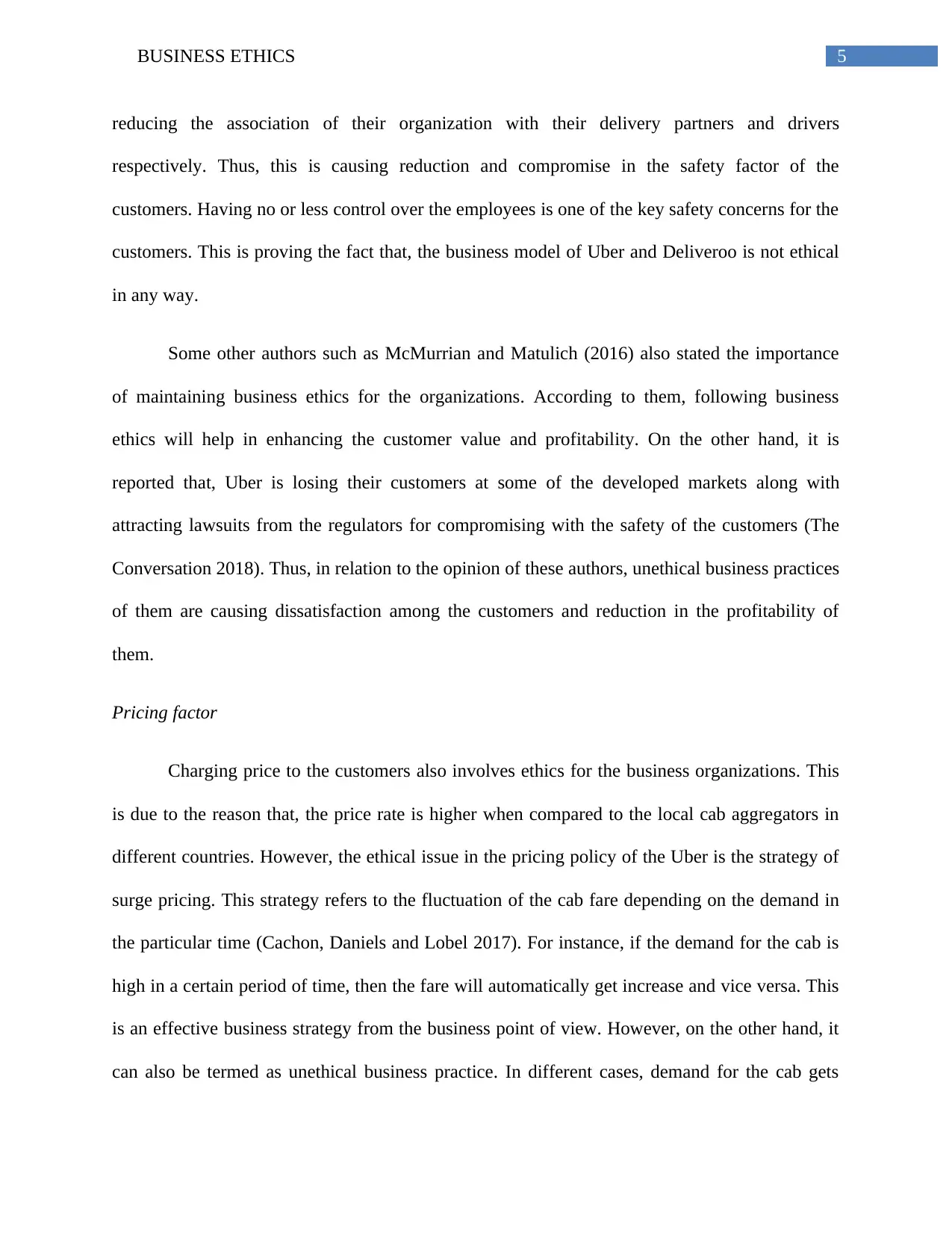
5BUSINESS ETHICS
reducing the association of their organization with their delivery partners and drivers
respectively. Thus, this is causing reduction and compromise in the safety factor of the
customers. Having no or less control over the employees is one of the key safety concerns for the
customers. This is proving the fact that, the business model of Uber and Deliveroo is not ethical
in any way.
Some other authors such as McMurrian and Matulich (2016) also stated the importance
of maintaining business ethics for the organizations. According to them, following business
ethics will help in enhancing the customer value and profitability. On the other hand, it is
reported that, Uber is losing their customers at some of the developed markets along with
attracting lawsuits from the regulators for compromising with the safety of the customers (The
Conversation 2018). Thus, in relation to the opinion of these authors, unethical business practices
of them are causing dissatisfaction among the customers and reduction in the profitability of
them.
Pricing factor
Charging price to the customers also involves ethics for the business organizations. This
is due to the reason that, the price rate is higher when compared to the local cab aggregators in
different countries. However, the ethical issue in the pricing policy of the Uber is the strategy of
surge pricing. This strategy refers to the fluctuation of the cab fare depending on the demand in
the particular time (Cachon, Daniels and Lobel 2017). For instance, if the demand for the cab is
high in a certain period of time, then the fare will automatically get increase and vice versa. This
is an effective business strategy from the business point of view. However, on the other hand, it
can also be termed as unethical business practice. In different cases, demand for the cab gets
reducing the association of their organization with their delivery partners and drivers
respectively. Thus, this is causing reduction and compromise in the safety factor of the
customers. Having no or less control over the employees is one of the key safety concerns for the
customers. This is proving the fact that, the business model of Uber and Deliveroo is not ethical
in any way.
Some other authors such as McMurrian and Matulich (2016) also stated the importance
of maintaining business ethics for the organizations. According to them, following business
ethics will help in enhancing the customer value and profitability. On the other hand, it is
reported that, Uber is losing their customers at some of the developed markets along with
attracting lawsuits from the regulators for compromising with the safety of the customers (The
Conversation 2018). Thus, in relation to the opinion of these authors, unethical business practices
of them are causing dissatisfaction among the customers and reduction in the profitability of
them.
Pricing factor
Charging price to the customers also involves ethics for the business organizations. This
is due to the reason that, the price rate is higher when compared to the local cab aggregators in
different countries. However, the ethical issue in the pricing policy of the Uber is the strategy of
surge pricing. This strategy refers to the fluctuation of the cab fare depending on the demand in
the particular time (Cachon, Daniels and Lobel 2017). For instance, if the demand for the cab is
high in a certain period of time, then the fare will automatically get increase and vice versa. This
is an effective business strategy from the business point of view. However, on the other hand, it
can also be termed as unethical business practice. In different cases, demand for the cab gets
⊘ This is a preview!⊘
Do you want full access?
Subscribe today to unlock all pages.

Trusted by 1+ million students worldwide
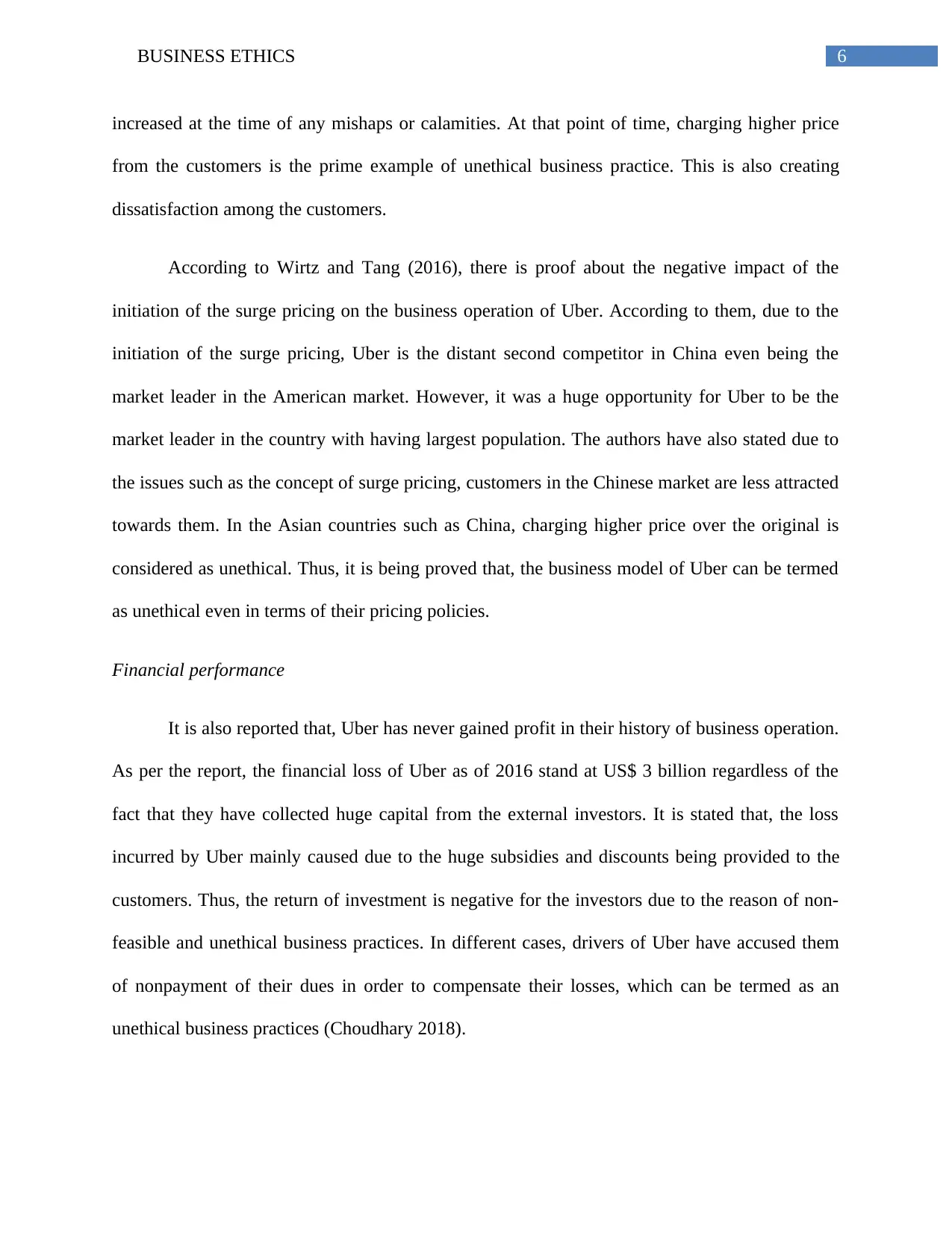
6BUSINESS ETHICS
increased at the time of any mishaps or calamities. At that point of time, charging higher price
from the customers is the prime example of unethical business practice. This is also creating
dissatisfaction among the customers.
According to Wirtz and Tang (2016), there is proof about the negative impact of the
initiation of the surge pricing on the business operation of Uber. According to them, due to the
initiation of the surge pricing, Uber is the distant second competitor in China even being the
market leader in the American market. However, it was a huge opportunity for Uber to be the
market leader in the country with having largest population. The authors have also stated due to
the issues such as the concept of surge pricing, customers in the Chinese market are less attracted
towards them. In the Asian countries such as China, charging higher price over the original is
considered as unethical. Thus, it is being proved that, the business model of Uber can be termed
as unethical even in terms of their pricing policies.
Financial performance
It is also reported that, Uber has never gained profit in their history of business operation.
As per the report, the financial loss of Uber as of 2016 stand at US$ 3 billion regardless of the
fact that they have collected huge capital from the external investors. It is stated that, the loss
incurred by Uber mainly caused due to the huge subsidies and discounts being provided to the
customers. Thus, the return of investment is negative for the investors due to the reason of non-
feasible and unethical business practices. In different cases, drivers of Uber have accused them
of nonpayment of their dues in order to compensate their losses, which can be termed as an
unethical business practices (Choudhary 2018).
increased at the time of any mishaps or calamities. At that point of time, charging higher price
from the customers is the prime example of unethical business practice. This is also creating
dissatisfaction among the customers.
According to Wirtz and Tang (2016), there is proof about the negative impact of the
initiation of the surge pricing on the business operation of Uber. According to them, due to the
initiation of the surge pricing, Uber is the distant second competitor in China even being the
market leader in the American market. However, it was a huge opportunity for Uber to be the
market leader in the country with having largest population. The authors have also stated due to
the issues such as the concept of surge pricing, customers in the Chinese market are less attracted
towards them. In the Asian countries such as China, charging higher price over the original is
considered as unethical. Thus, it is being proved that, the business model of Uber can be termed
as unethical even in terms of their pricing policies.
Financial performance
It is also reported that, Uber has never gained profit in their history of business operation.
As per the report, the financial loss of Uber as of 2016 stand at US$ 3 billion regardless of the
fact that they have collected huge capital from the external investors. It is stated that, the loss
incurred by Uber mainly caused due to the huge subsidies and discounts being provided to the
customers. Thus, the return of investment is negative for the investors due to the reason of non-
feasible and unethical business practices. In different cases, drivers of Uber have accused them
of nonpayment of their dues in order to compensate their losses, which can be termed as an
unethical business practices (Choudhary 2018).
Paraphrase This Document
Need a fresh take? Get an instant paraphrase of this document with our AI Paraphraser
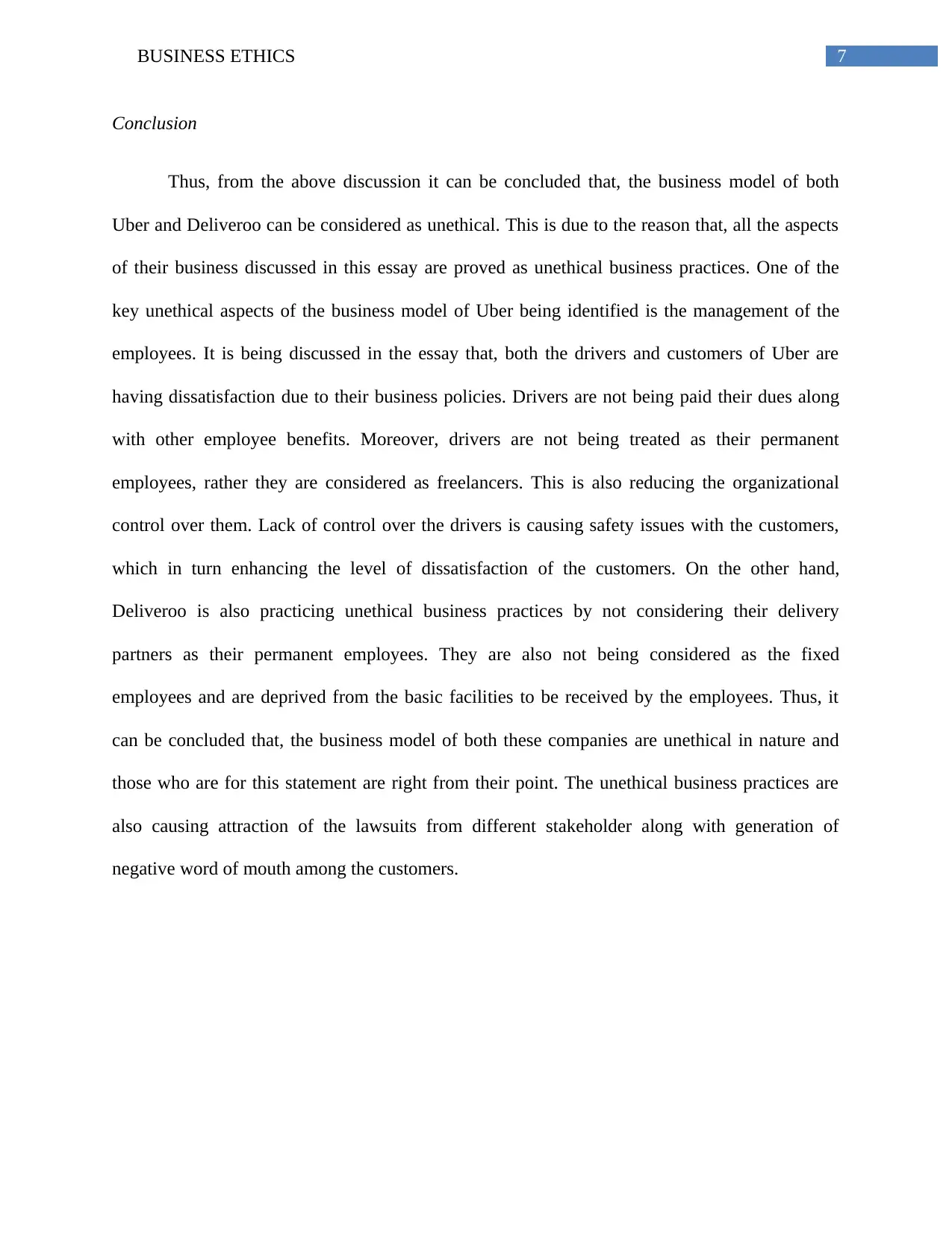
7BUSINESS ETHICS
Conclusion
Thus, from the above discussion it can be concluded that, the business model of both
Uber and Deliveroo can be considered as unethical. This is due to the reason that, all the aspects
of their business discussed in this essay are proved as unethical business practices. One of the
key unethical aspects of the business model of Uber being identified is the management of the
employees. It is being discussed in the essay that, both the drivers and customers of Uber are
having dissatisfaction due to their business policies. Drivers are not being paid their dues along
with other employee benefits. Moreover, drivers are not being treated as their permanent
employees, rather they are considered as freelancers. This is also reducing the organizational
control over them. Lack of control over the drivers is causing safety issues with the customers,
which in turn enhancing the level of dissatisfaction of the customers. On the other hand,
Deliveroo is also practicing unethical business practices by not considering their delivery
partners as their permanent employees. They are also not being considered as the fixed
employees and are deprived from the basic facilities to be received by the employees. Thus, it
can be concluded that, the business model of both these companies are unethical in nature and
those who are for this statement are right from their point. The unethical business practices are
also causing attraction of the lawsuits from different stakeholder along with generation of
negative word of mouth among the customers.
Conclusion
Thus, from the above discussion it can be concluded that, the business model of both
Uber and Deliveroo can be considered as unethical. This is due to the reason that, all the aspects
of their business discussed in this essay are proved as unethical business practices. One of the
key unethical aspects of the business model of Uber being identified is the management of the
employees. It is being discussed in the essay that, both the drivers and customers of Uber are
having dissatisfaction due to their business policies. Drivers are not being paid their dues along
with other employee benefits. Moreover, drivers are not being treated as their permanent
employees, rather they are considered as freelancers. This is also reducing the organizational
control over them. Lack of control over the drivers is causing safety issues with the customers,
which in turn enhancing the level of dissatisfaction of the customers. On the other hand,
Deliveroo is also practicing unethical business practices by not considering their delivery
partners as their permanent employees. They are also not being considered as the fixed
employees and are deprived from the basic facilities to be received by the employees. Thus, it
can be concluded that, the business model of both these companies are unethical in nature and
those who are for this statement are right from their point. The unethical business practices are
also causing attraction of the lawsuits from different stakeholder along with generation of
negative word of mouth among the customers.
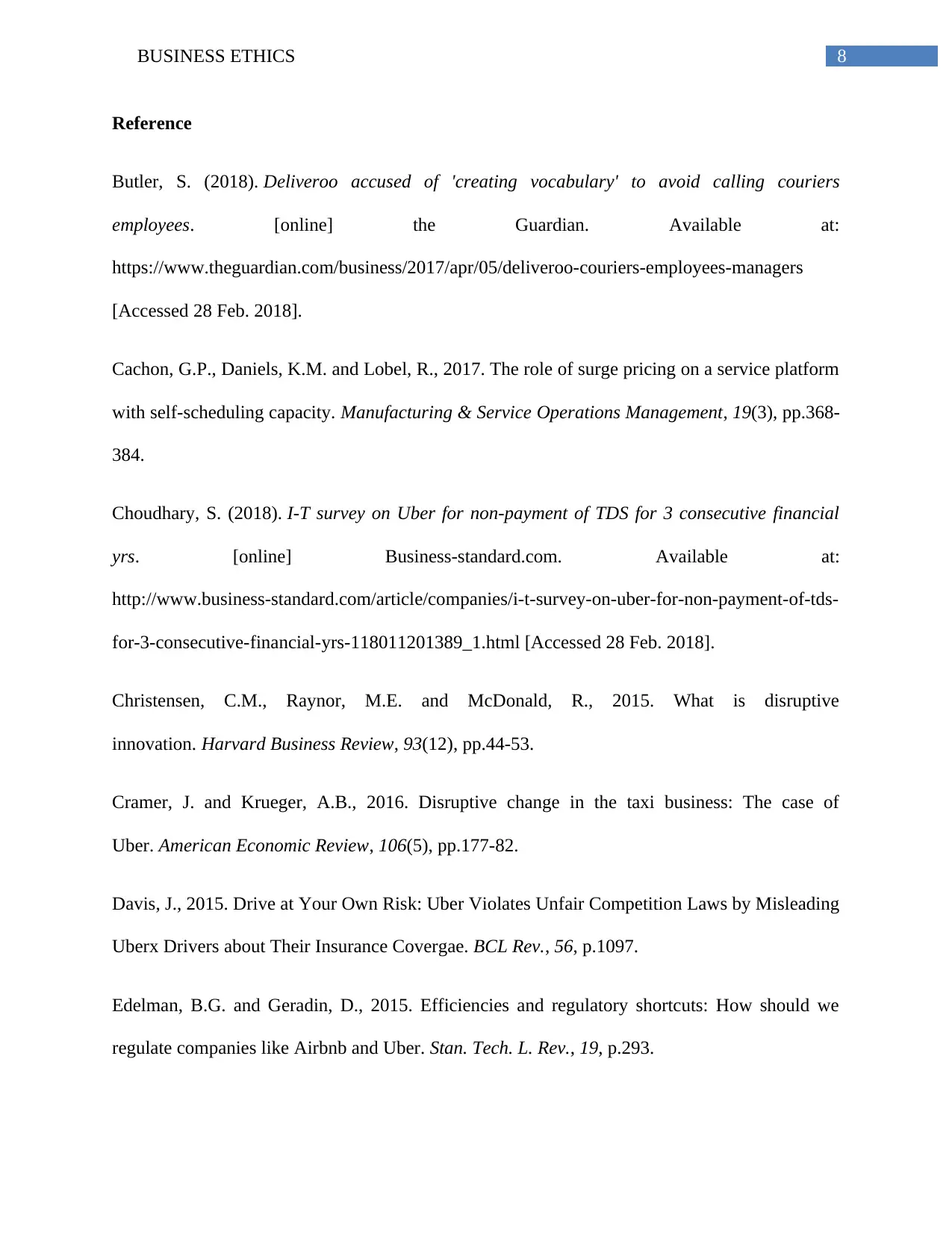
8BUSINESS ETHICS
Reference
Butler, S. (2018). Deliveroo accused of 'creating vocabulary' to avoid calling couriers
employees. [online] the Guardian. Available at:
https://www.theguardian.com/business/2017/apr/05/deliveroo-couriers-employees-managers
[Accessed 28 Feb. 2018].
Cachon, G.P., Daniels, K.M. and Lobel, R., 2017. The role of surge pricing on a service platform
with self-scheduling capacity. Manufacturing & Service Operations Management, 19(3), pp.368-
384.
Choudhary, S. (2018). I-T survey on Uber for non-payment of TDS for 3 consecutive financial
yrs. [online] Business-standard.com. Available at:
http://www.business-standard.com/article/companies/i-t-survey-on-uber-for-non-payment-of-tds-
for-3-consecutive-financial-yrs-118011201389_1.html [Accessed 28 Feb. 2018].
Christensen, C.M., Raynor, M.E. and McDonald, R., 2015. What is disruptive
innovation. Harvard Business Review, 93(12), pp.44-53.
Cramer, J. and Krueger, A.B., 2016. Disruptive change in the taxi business: The case of
Uber. American Economic Review, 106(5), pp.177-82.
Davis, J., 2015. Drive at Your Own Risk: Uber Violates Unfair Competition Laws by Misleading
Uberx Drivers about Their Insurance Covergae. BCL Rev., 56, p.1097.
Edelman, B.G. and Geradin, D., 2015. Efficiencies and regulatory shortcuts: How should we
regulate companies like Airbnb and Uber. Stan. Tech. L. Rev., 19, p.293.
Reference
Butler, S. (2018). Deliveroo accused of 'creating vocabulary' to avoid calling couriers
employees. [online] the Guardian. Available at:
https://www.theguardian.com/business/2017/apr/05/deliveroo-couriers-employees-managers
[Accessed 28 Feb. 2018].
Cachon, G.P., Daniels, K.M. and Lobel, R., 2017. The role of surge pricing on a service platform
with self-scheduling capacity. Manufacturing & Service Operations Management, 19(3), pp.368-
384.
Choudhary, S. (2018). I-T survey on Uber for non-payment of TDS for 3 consecutive financial
yrs. [online] Business-standard.com. Available at:
http://www.business-standard.com/article/companies/i-t-survey-on-uber-for-non-payment-of-tds-
for-3-consecutive-financial-yrs-118011201389_1.html [Accessed 28 Feb. 2018].
Christensen, C.M., Raynor, M.E. and McDonald, R., 2015. What is disruptive
innovation. Harvard Business Review, 93(12), pp.44-53.
Cramer, J. and Krueger, A.B., 2016. Disruptive change in the taxi business: The case of
Uber. American Economic Review, 106(5), pp.177-82.
Davis, J., 2015. Drive at Your Own Risk: Uber Violates Unfair Competition Laws by Misleading
Uberx Drivers about Their Insurance Covergae. BCL Rev., 56, p.1097.
Edelman, B.G. and Geradin, D., 2015. Efficiencies and regulatory shortcuts: How should we
regulate companies like Airbnb and Uber. Stan. Tech. L. Rev., 19, p.293.
⊘ This is a preview!⊘
Do you want full access?
Subscribe today to unlock all pages.

Trusted by 1+ million students worldwide
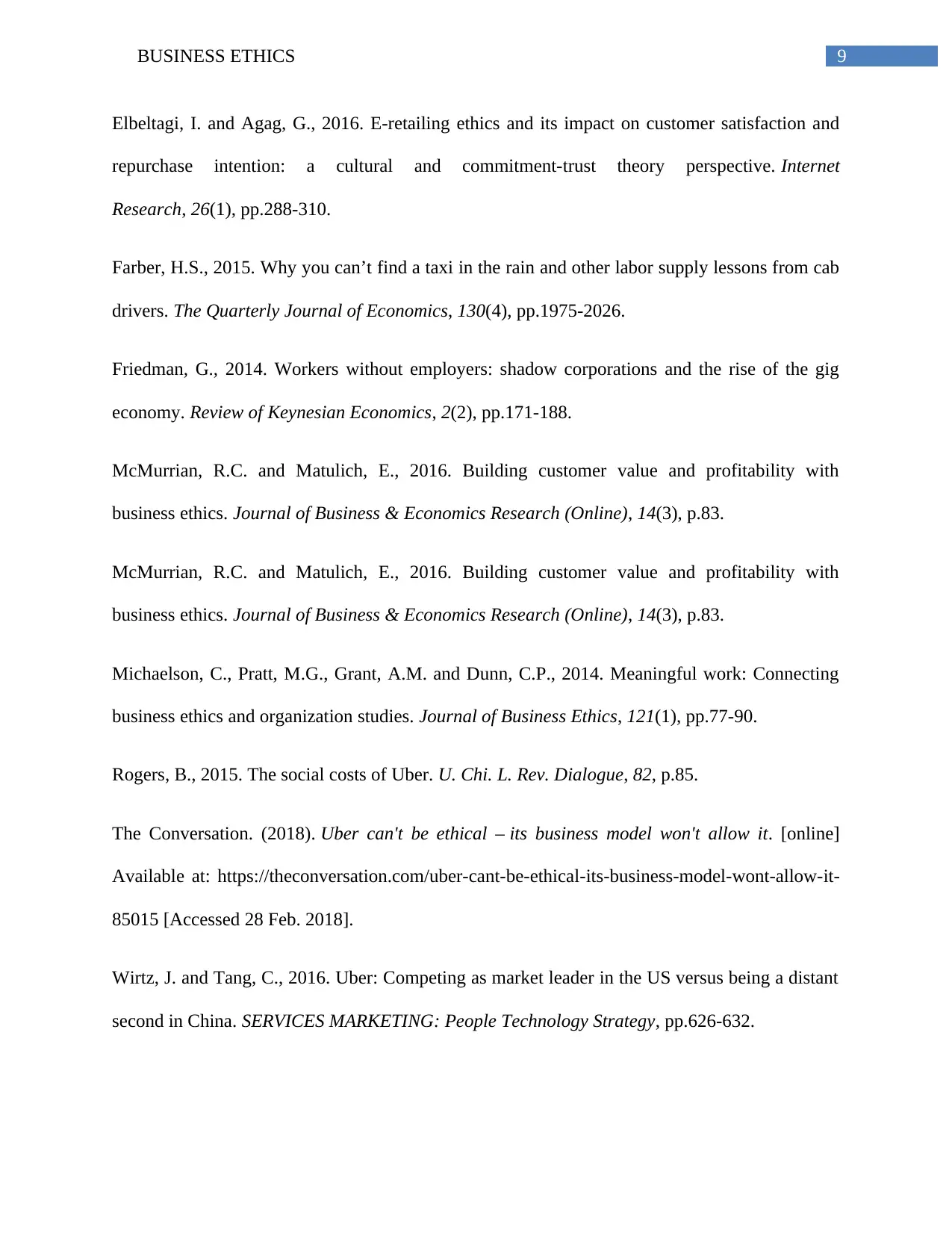
9BUSINESS ETHICS
Elbeltagi, I. and Agag, G., 2016. E-retailing ethics and its impact on customer satisfaction and
repurchase intention: a cultural and commitment-trust theory perspective. Internet
Research, 26(1), pp.288-310.
Farber, H.S., 2015. Why you can’t find a taxi in the rain and other labor supply lessons from cab
drivers. The Quarterly Journal of Economics, 130(4), pp.1975-2026.
Friedman, G., 2014. Workers without employers: shadow corporations and the rise of the gig
economy. Review of Keynesian Economics, 2(2), pp.171-188.
McMurrian, R.C. and Matulich, E., 2016. Building customer value and profitability with
business ethics. Journal of Business & Economics Research (Online), 14(3), p.83.
McMurrian, R.C. and Matulich, E., 2016. Building customer value and profitability with
business ethics. Journal of Business & Economics Research (Online), 14(3), p.83.
Michaelson, C., Pratt, M.G., Grant, A.M. and Dunn, C.P., 2014. Meaningful work: Connecting
business ethics and organization studies. Journal of Business Ethics, 121(1), pp.77-90.
Rogers, B., 2015. The social costs of Uber. U. Chi. L. Rev. Dialogue, 82, p.85.
The Conversation. (2018). Uber can't be ethical – its business model won't allow it. [online]
Available at: https://theconversation.com/uber-cant-be-ethical-its-business-model-wont-allow-it-
85015 [Accessed 28 Feb. 2018].
Wirtz, J. and Tang, C., 2016. Uber: Competing as market leader in the US versus being a distant
second in China. SERVICES MARKETING: People Technology Strategy, pp.626-632.
Elbeltagi, I. and Agag, G., 2016. E-retailing ethics and its impact on customer satisfaction and
repurchase intention: a cultural and commitment-trust theory perspective. Internet
Research, 26(1), pp.288-310.
Farber, H.S., 2015. Why you can’t find a taxi in the rain and other labor supply lessons from cab
drivers. The Quarterly Journal of Economics, 130(4), pp.1975-2026.
Friedman, G., 2014. Workers without employers: shadow corporations and the rise of the gig
economy. Review of Keynesian Economics, 2(2), pp.171-188.
McMurrian, R.C. and Matulich, E., 2016. Building customer value and profitability with
business ethics. Journal of Business & Economics Research (Online), 14(3), p.83.
McMurrian, R.C. and Matulich, E., 2016. Building customer value and profitability with
business ethics. Journal of Business & Economics Research (Online), 14(3), p.83.
Michaelson, C., Pratt, M.G., Grant, A.M. and Dunn, C.P., 2014. Meaningful work: Connecting
business ethics and organization studies. Journal of Business Ethics, 121(1), pp.77-90.
Rogers, B., 2015. The social costs of Uber. U. Chi. L. Rev. Dialogue, 82, p.85.
The Conversation. (2018). Uber can't be ethical – its business model won't allow it. [online]
Available at: https://theconversation.com/uber-cant-be-ethical-its-business-model-wont-allow-it-
85015 [Accessed 28 Feb. 2018].
Wirtz, J. and Tang, C., 2016. Uber: Competing as market leader in the US versus being a distant
second in China. SERVICES MARKETING: People Technology Strategy, pp.626-632.
1 out of 10
Related Documents
Your All-in-One AI-Powered Toolkit for Academic Success.
+13062052269
info@desklib.com
Available 24*7 on WhatsApp / Email
![[object Object]](/_next/static/media/star-bottom.7253800d.svg)
Unlock your academic potential
Copyright © 2020–2026 A2Z Services. All Rights Reserved. Developed and managed by ZUCOL.





